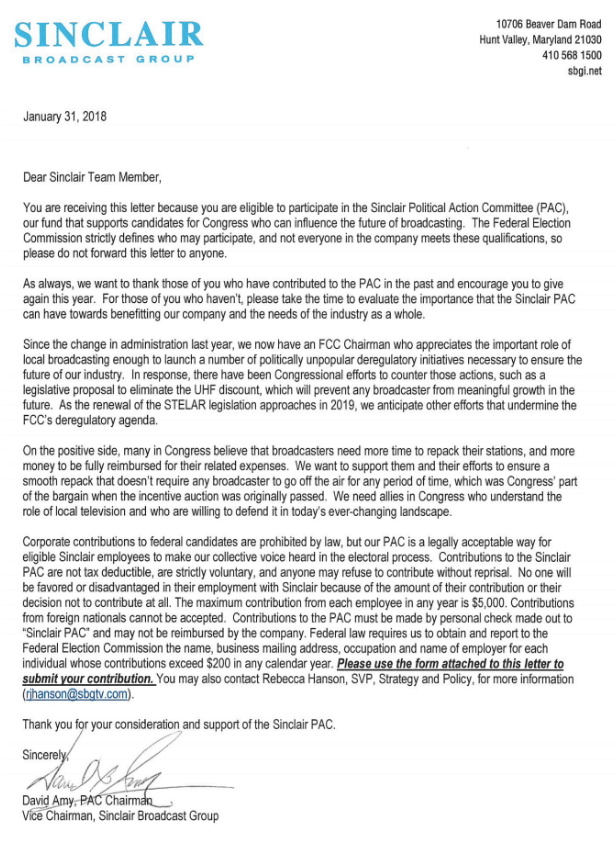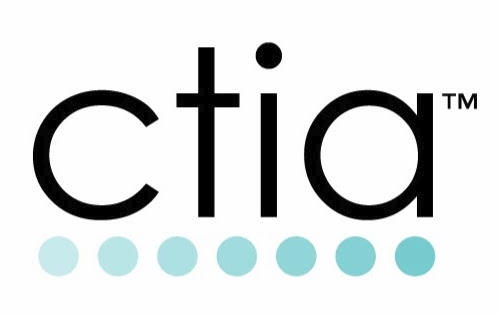
Blackburn
One of the telecom industry’s most notorious favorites – Rep. Marsha Blackburn (R-AT&T), is running for departing Sen. Bob Corker’s seat in the U.S. Senate, and she will enjoy extra support from Sinclair-owned television stations across the state of Tennessee, sometimes whether those stations want to support her candidacy or not.
Blackburn has a long history supporting the corporate agendas of AT&T and Comcast, pushing for deregulation, blocks on community-owned broadband networks, and opposition to net neutrality. She is the telecom industry’s most reliable member of Congress, willing to introduce new legislation custom-written by industry lobbyists. The Tennessee Tribune noted that Blackburn’s lackluster performance in Congress as little more than an “errand boy” was foreshadowed by Blackburn herself in each of her political races:
During political events when Blackburn first ran for Congress, she said she wanted the job so she could support George W. Bush’s agenda. Later it was to fight Barrack Obama. Now, as Blackburn spokesperson Andrea Bozek told the Associated Press, “We want to ensure President Trump has a reliable vote in the U.S. Senate.”
The AP’s Feb. 14 story confirms the congressman’s consistent posture displayed in person and other ways. She’s spoken of the “leadership” she’s followed. Blackburn’s also behaved like loyal party members by holding private, invited-guests-only sessions, usually for fundraising. In recent months, she excluded the press from a program on telecommunications.
Blackburn has boldly said she’s doing what the people tell her they want. Now, she wants to be a U.S. senator.
Polls in Tennessee show Blackburn trailing against moderate Democrat Phil Bredesen, a former Tennessee governor. That has her corporate allies worried, particularly in the telecommunications and broadcasting business.
Baltimore-area based Sinclair Broadcast Group, which owns or runs more than 200 television stations around the United States, has been under fire for quietly inserting conservative and pro-Trump stories into the local newscasts of the stations it programs, without disclosing those stories have a deliberate spin defending the Trump Administration or various conservative causes favored by Sinclair Broadcasting’s executives. In March, Deadspin produced a video showing uncomfortable local newscasters across the country forced to read a scripted Sinclair promotion attacking the media for “fake news” — a corporate campaign that quickly won praise from President Donald Trump and scorn by media watchdog groups and many viewers.
So funny to watch Fake News Networks, among the most dishonest groups of people I have ever dealt with, criticize Sinclair Broadcasting for being biased. Sinclair is far superior to CNN and even more Fake NBC, which is a total joke.
— Donald J. Trump (@realDonaldTrump) April 2, 2018
Sinclair is the only station owner in the country that requires its stations to insert pre-produced news stories and commentaries it calls “must-runs” that do not always tell viewers in full disclosure those segments and news stories were produced by Sinclair’s corporate owners from studios in Maryland. This fall, Sinclair plans to ramp up coverage of the 2018 mid-term elections with recently hired reporters, one who formerly worked for the Russian government-owned RT propaganda outlet, to produce political stories that will be required to air by Sinclair’s local stations nationwide. In fact, Sinclair has hundreds of job listings on help-wanted websites.
Among Sinclair’s top priorities for the fall is getting Rep. Blackburn installed in the U.S. Senate. No elected official has received greater support from Sinclair’s PAC than Blackburn. According to Poyntor, Blackburn has already received $4,500 from Sinclair this year. She is the current chair of the House Communications and Technology subcommittee, which oversees the FCC, the same agency headed by Chairman Ajit Pai that has bent over backwards for Sinclair and its efforts to acquire additional stations, including some of the biggest outlets in the country currently owned by Tribune Broadcasting. Pai is now under investigation by the FCC’s inspector general for possible collusion with Sinclair.
![]() The New York Times’ investigation into the close relationship between Sinclair and Pai has been strengthened with evidence Pai and his staff members have frequently met and corresponded with Sinclair executives several times, usually coinciding with agenda items at the telecommunications regulator that have an impact on Sinclair’s business. The meetings, including one with Sinclair’s executive chairman just days before Pai was appointed to head the FCC by President Trump, have raised eyebrows among some members of Congress, but not Rep. Blackburn.
The New York Times’ investigation into the close relationship between Sinclair and Pai has been strengthened with evidence Pai and his staff members have frequently met and corresponded with Sinclair executives several times, usually coinciding with agenda items at the telecommunications regulator that have an impact on Sinclair’s business. The meetings, including one with Sinclair’s executive chairman just days before Pai was appointed to head the FCC by President Trump, have raised eyebrows among some members of Congress, but not Rep. Blackburn.
Sinclair’s top lobbyist, a former FCC official, also communicated frequently with former agency colleagues and pushed for the relaxation of media ownership rules, the Times reported. Pai’s talking points about relaxing media ownership rules were suspiciously nearly identical to the language the lobbyist provided the agency promoting the rules change that will allow Sinclair to grow even larger.
Sinclair’s executives need Blackburn’s support to keep Congress in check as the company grows its station count well above long-standing federal station ownership caps that Pai has systematically sought to relax. Putting her in the U.S. Senate could be critical to protect Sinclair, especially if Republicans lose control of the U.S. House of Representatives in this year’s mid-term elections.
In January, Sinclair mailed letters to its station’s managers urging they quietly participate in Sinclair’s PAC, asking each to contribute up to $5,000. Sinclair will spend that money supporting candidates like Blackburn. A copy of the letter was obtained by FTVLive.
You are receiving this letter because you are eligible to participate in the Sinclair Political Action Committee (PAC), our fund that supports candidates for Congress who can influence the future of broadcasting. The Federal Election Commission strictly defines who may participate, and not everyone in the company meets these qualifications, so please do not forward this letter to anyone.
[…] Since the change in administration last year, we now have an FCC chairman who appreciates the important role of local broadcasting enough to launch a number of politically unpopular deregulatory initiatives necessary to ensure the future of our industry. In response, there have been Congressional efforts to counter those actions, such as a legislative proposal to eliminate the UHF discount, which will prevent any broadcaster from meaningful growth in the future. […] We need allies in Congress who understand the role of local television and who are willing to defend it in today’s ever-changing landscape.
Corporate contributions to federal candidates are prohibited by law, but our PAC is a legally acceptable way for eligible Sinclair employees to make our collective voice heard in the electoral process.

In addition to direct financial support, Sinclair is expected to produce additional news stories and commentaries it will force-air on its stations that echo the themes and views of the candidates the company supports. Sinclair owns five stations in Nashville and Chattanooga and will own a sixth in Memphis if the FCC approves Sinclair’s acquisition of Tribune-owned television stations.
Sinclair’s Tennessee stations are already loaded with Sinclair’s editorials and slanted news coverage pieces that are required to air as part of the stations’ local newscasts. But some stations also air extra weekly news shows that swing to the right, including one hosted by conservative commentator Armstrong Williams, who bought television stations through his entity Howard Stirk Holdings, using Sinclair’s money and contracts with Sinclair to run “his” stations.

 WTVC (NewsChannel 9) and WFLI (The CW) in Chattanooga
WTVC (NewsChannel 9) and WFLI (The CW) in Chattanooga
- Sinclair-owned WTVC (NewsChannel 9) in Chattanooga regularly airs at least some of Sinclair’s “must-run” content, including nationally produced news packages, and it aired the recent anchor-read scripted segments about media bias. News Channel 9 also airs Sinclair’s weekly news shows Full Measure with Sharyl Attkisson and The Armstrong Williams Show. WTVC 9.2 (a subchannel of WTVC) hosts Chattanooga’s Fox affiliate, Fox Chattanooga.
- MPS Media-owned WFLI (The CW Chattanooga) “receives certain services from an affiliation of Sinclair” and occasionally re-airs some of Fox Chattanooga’s local news programming, such as its 10 p.m. Saturday newscasts. The two stations share a main studio address.
![]() WZTV (Fox 17), WUXP (My30), and WNAB (CW58) in Nashville
WZTV (Fox 17), WUXP (My30), and WNAB (CW58) in Nashville
- Sinclair-owned WZTV (Fox 17) also regularly airs at least some of Sinclair’s “must-run” content, including nationally produced news packages, fearmongering “Terrorism Alert Desk” updates, and the weekly show Full Measure.
- Sinclair-owned WUXP (My30) shares a main studio address with Fox 17 and re-airs at least some of Fox 17’s local news programming.
- Nashville Broadcasting-owned WNAB (The CW58) “receives certain services from an affiliation of Sinclair Broadcast Group” and also shares a main studio address with Fox 17 and My30. It does not appear to regularly air news programming.
Coming soon: WREG (News Channel 3) in Memphis
- WREG (News Channel 3) in Memphis is currently owned by Tribune Media but will soon be owned by Sinclair if the company’s pending acquisition of up to 42 Tribune stations is approved.
(programming details courtesy of Media Matters)


 Subscribe
Subscribe
 Pierce’s alleged scheme fell apart when Quintillion began invoicing clients based on the fake contracts. At least one protested, claiming it did not use Quintillion’s network. A subsequent internal investigation allegedly founds dozens of phony contracts kept in Pierce’s Google Drive account, with at least 78 moved to the service’s trash bin 48 hours before investigators began searching Pierce’s computer. Prosecutors were able to recover the deleted documents with a search warrant presented to Google.
Pierce’s alleged scheme fell apart when Quintillion began invoicing clients based on the fake contracts. At least one protested, claiming it did not use Quintillion’s network. A subsequent internal investigation allegedly founds dozens of phony contracts kept in Pierce’s Google Drive account, with at least 78 moved to the service’s trash bin 48 hours before investigators began searching Pierce’s computer. Prosecutors were able to recover the deleted documents with a search warrant presented to Google. The head of a state-funded group with direct ties to the Massachusetts governor’s office told local officials in New Marlborough that the Massachusetts Broadband Institute (MBI) “believes in cable companies” and is favoring one — Charter Communications, with an exclusive offer to invest millions in taxpayer dollars to entice Charter to bring its Spectrum cable service to town, while telling would-be competitors the money is only available to Charter Communications.
The head of a state-funded group with direct ties to the Massachusetts governor’s office told local officials in New Marlborough that the Massachusetts Broadband Institute (MBI) “believes in cable companies” and is favoring one — Charter Communications, with an exclusive offer to invest millions in taxpayer dollars to entice Charter to bring its Spectrum cable service to town, while telling would-be competitors the money is only available to Charter Communications.
 Town resident Dave Travis called Larkin’s offer something else.
Town resident Dave Travis called Larkin’s offer something else. The wireless industry’s largest lobbying group, CTIA-The Wireless Association,
The wireless industry’s largest lobbying group, CTIA-The Wireless Association,  The CTIA doesn’t dwell on the real world impact of its member companies, with revenues well into the billions of dollars, simply absorbing the 36¢ a month charged to their Utah customers as a cost of doing business. Instead, the lawsuit argues Utah cannot apply USF surcharges in a way that is “inconsistent with the requirements related to the federal universal service Lifeline program.”
The CTIA doesn’t dwell on the real world impact of its member companies, with revenues well into the billions of dollars, simply absorbing the 36¢ a month charged to their Utah customers as a cost of doing business. Instead, the lawsuit argues Utah cannot apply USF surcharges in a way that is “inconsistent with the requirements related to the federal universal service Lifeline program.” The Wall Street Journal today
The Wall Street Journal today 